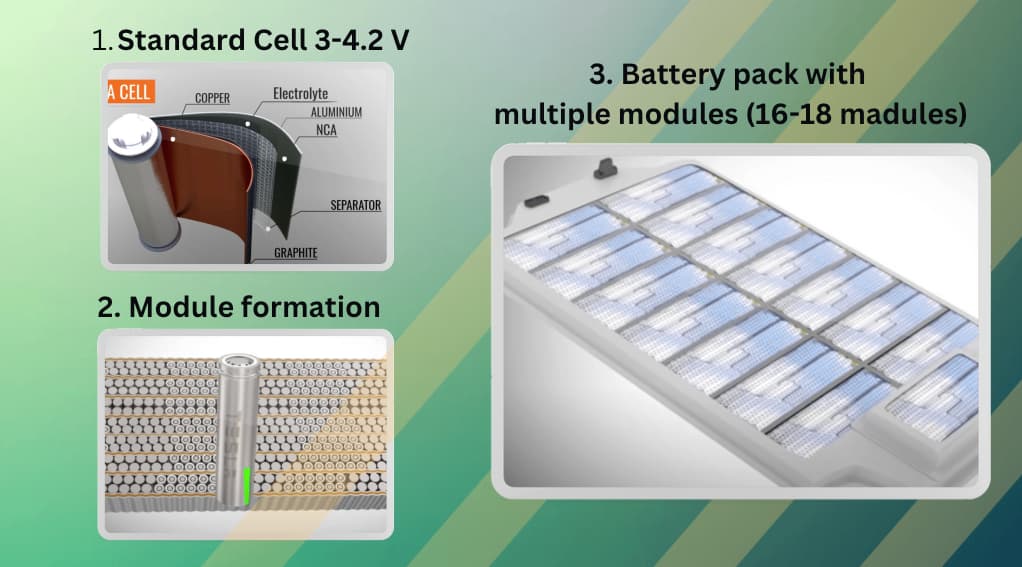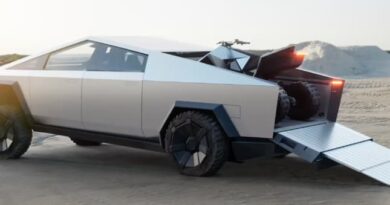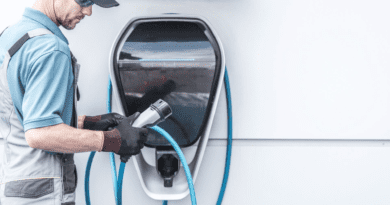Electric car battery | Types, replacement cost, upcoming innovation (as of 2023)
Electric Car batteries is an essential component of electric vehicles (EVs), as they provide the energy needed to power the vehicle. Without a battery, an EV would not be able to function. Battery design, size and capacity determines the range of an EV, or how far it can travel on a single charge. The quality and performance of the battery can have a significant impact on the overall performance of an EV, including its acceleration and top speed. The cost of the battery is a major factor in the overall cost of an EV. As battery technology improves and becomes more efficient, the cost of EVs is expected to decrease. Overall, batteries are a critical component of EVs, and their importance will only continue to grow as the use of EVs becomes more widespread.
How does electric car batteries work?
In day to day life, we are using small form of lithium-ion (Li-ion) batteries for most of our consumer electronics such as cell phones and laptops. EV batteries are much like a scaled up version of lithium-ion batteries from your laptop. Electric Car battery is a pack of thousands of smaller Li-ion cells working together to store the energy. When the car is plugged for charging, electricity I used to make chemical changes inside the battery pack to store the energy. When we drive the car, same store energy is delivered in the form of electricity. Electric Car Batteries undergoes cycles of “charge” and “discharge”.
Car battery is connected to the car’s one or more electric motors, which drives the wheels. When driver press the accelerator, the electricity from the battery is provided to the electric motor which then start rotating and car get moving.
Car’s electric motor also acts as generators i.e. when you put on brakes or takes foot off the accelerator, car begins to slow down by converting the forward motion back into electricity which then is used to recharge the batteries. This phenomenon is also referred as regenerative braking, which helps capture the energy that would otherwise be lost. This feature helps to recharge the car battery and improved the car’s driving range.
Types of Electric Car Batteries:
There are several different types of Electric Car Batteries that can be used in electric vehicles (EVs), including Lead-acid batteries, Nickel-metal-hydride batteries, Lithium-ion batteries, Nickel-cadmium batteries. When selecting a battery for an EV, it’s important to consider factors such as cost, weight, energy density, and lifespan. The right battery for a particular EV will depend on its intended use and the specific needs of the electric vehicle.
Lithium-Ion Batteries
Lithium-ion batteries are a type of rechargeable battery that are widely used in a variety of applications, including electric vehicles (EVs). They are known for their high energy density, which means they can store a large amount of energy in a relatively small and lightweight package. This makes them an attractive choice for use in EVs, as it allows for a smaller and lighter battery pack, which can improve the vehicle’s performance and range.
Lithium-ion batteries also have a relatively long lifespan, with some models able to retain a significant portion of their original capacity after several thousand charge-discharge cycles. This makes them a good choice for applications where the battery will be used frequently, such as in an EV.
There are several different types of lithium-ion batteries, each with its own unique characteristics. For example, some lithium-ion batteries are better suited for high-power applications, while others are optimized for high energy density. When selecting a lithium-ion battery for an EV, it’s important to consider factors such as the desired range, performance requirements, and budget.
Most of todays electric vehicles use rechargeable Lithium-Ion Batteries for their energy storage needs. Lithium ion batteries provide high power to power ratio, high energy density, high energy efficiency, and better performance at high temperatures. This helps battery manufactures to develop more efficient and high performance battery pack designs. Lithium ion batteries have few variants based on the chemical composition. Typically, Lithium Cobalt Oxide (LCO) and Lithium Nickel Cobalt Oxide (NCA) are commonly used variants due to their high energy-density attribute.
Overall, lithium-ion batteries are a popular choice for use in EVs due to their high energy density and long lifespan. However, they can be expensive, and there are concerns about the sustainability of some of the materials used in their production.

Nickel-Metal Hybride Batteries
Nickel-metal hydride (NiMH) batteries are a type of rechargeable battery that can be used in electric vehicles (EVs). They have several advantages over other types of batteries, including a higher energy density and a longer lifespan.
One of the main benefits of NiMH batteries is that they have a higher energy density than lead-acid batteries, which means they can store more energy in a given volume. This can be helpful for EVs, as it allows for a smaller and lighter battery pack, which can improve the vehicle’s performance and range.
NiMH batteries also have a longer lifespan than lead-acid batteries, which means they can be used for a longer period of time before needing to be replaced. This can be an important consideration for EVs, as replacing the battery pack can be a costly and time-consuming process.
Despite their advantages, NiMH batteries do have some limitations. They are more expensive than lead-acid batteries, and they are more sensitive to temperature changes, which can affect their performance. Additionally, NiMH batteries can generate heat during use, which can be a concern for some applications.
Typically, these batteries are used in hybrid electric vehicles from Honda and Toyota. e.g. Toyota Prius.
Overall, NiMH batteries are a good choice for EVs, particularly for those that require a high energy density and a long lifespan. However, it’s important to carefully consider the pros and cons of NiMH batteries and compare them to other types of batteries before making a decision.
Electric car battery life span
The life of an electric car battery can vary depending on several factors, including the type of battery, the vehicle’s design and usage patterns, and how well the battery is maintained. Here are some general points to consider:
- Lithium-ion batteries, which are commonly used in electric vehicles (EVs), typically have a lifespan of around 8 to 10 years. However, this can vary depending on the specific battery chemistry and the way the battery is used. For example, batteries that are frequently charged and discharged at a high rate (such as in a performance EV) may have a shorter lifespan than batteries that are used more gently.
- The overall range of an EV, which is the distance it can travel on a single charge, can also be affected by the battery’s age. As a battery ages, its capacity (the amount of energy it can store) may decrease, which can lead to a reduction in range.
- Proper battery maintenance can help extend the life of an EV battery. This can include keeping the battery charged within a certain range (e.g., not fully discharging it or leaving it fully charged for long periods of time), avoiding extreme temperatures, and using a compatible charger.
- Some EVs come with a battery warranty that covers the cost of replacing the battery if it fails within a certain time frame (e.g., 8 years or 100,000 miles). It’s worth noting that the warranty may not cover all causes of battery failure, and the replacement cost for a battery can be expensive.
While purchasing an electric vehicle, pay attention to the terms and conditions related to the car battery warranty, maintenance exceptions and battery replacement cost. It will help the potential EV buyer make an informed decision.
Electric Car Battery – replacement cost:
The life of an electric car battery can vary depending on several factors, including the type of battery, the vehicle’s design and usage patterns, and how well the battery is maintained. Here are some general points to consider:
Lithium-ion batteries, which are commonly used in electric vehicles (EVs), typically have a lifespan of around 8 to 10 years. However, this can vary depending on the specific battery chemistry and the way the battery is used. For example, batteries that are frequently charged and discharged at a high rate (such as in a performance EV) may have a shorter lifespan than batteries that are used more gently.
The overall range of an EV, which is the distance it can travel on a single charge, can also be affected by the battery’s age. As a battery ages, its capacity (the amount of energy it can store) may decrease, which can lead to a reduction in range.
Proper battery maintenance can help extend the life of an EV battery. This can include keeping the battery charged within a certain range (e.g., not fully discharging it or leaving it fully charged for long periods of time), avoiding extreme temperatures, and using a compatible charger.
Some EVs come with a battery warranty that covers the cost of replacing the battery if it fails within a certain time frame (e.g., 8 years or 100,000 miles). It’s worth noting that the warranty may not cover all causes of battery failure, and the replacement cost for a battery can be expensive.
Electric car battery manufacturing companies in USA
There are several companies that manufacture electric car (EV) batteries in the United States. Here are a few examples:
Tesla: Tesla is a well-known EV manufacturer that also manufactures its own batteries at its Gigafactory in Nevada. The company produces lithium-ion batteries for its own EVs, as well as for other companies and industries.
LG Chem: LG Chem is a South Korean chemical company that has a battery manufacturing facility in Michigan. The company produces lithium-ion batteries for a range of EVs, including the Chevrolet Bolt and Hyundai Kona Electric.
CATL: CATL (Contemporary Amperex Technology Co. Ltd.) is a Chinese company that has a battery manufacturing facility in Ohio. The company produces lithium-ion batteries for a range of EVs, including the BMW i3 and Nissan Leaf.
A123 Systems: A123 Systems is an American company that specializes in the design and manufacture of advanced lithium-ion batteries. The company has manufacturing facilities in Michigan and China, and supplies batteries for a variety of EV and energy storage applications.
Panasonic: Panasonic is a Japanese electronics company that has a battery manufacturing facility in Nevada in partnership with Tesla. The company produces lithium-ion batteries for a range of EVs, including the Tesla Model S and Model X.
Innovation in EV battery technology:
There are several technologies that are being developed that have the potential to improve electric vehicle (EV) battery performance and reduce the cost of EVs. Here are a few examples of innovations in EV battery technology:
Solid state batteries: Solid state batteries are a type of advanced battery technology that uses solid electrolytes instead of liquid electrolytes, which are found in traditional lithium-ion batteries. Solid state batteries have the potential to significantly improve energy density, which could lead to longer driving range for EVs. They are also less prone to overheating and fires, and can be charged faster than traditional lithium-ion batteries.
Lithium-sulfur batteries: Lithium-sulfur batteries are a type of advanced battery technology that uses lithium and sulfur as the cathode and anode, respectively. These batteries have the potential to significantly improve energy density and reduce the cost of EVs. They are also environmentally friendly, as they do not use rare or toxic materials.
High-capacity cathodes: Researchers are working on developing cathode materials that can store more lithium ions, which could lead to higher energy density and longer driving range for EVs. Examples of high-capacity cathode materials include lithium iron phosphate (LFP), lithium nickel cobalt aluminum oxide (NCA), and lithium manganese oxide (LMO).
Enhanced battery management systems: Battery management systems are used to monitor and control the charging and discharging of EV batteries. Researchers are working on developing enhanced battery management systems that can improve battery performance, extend the lifespan of the battery, and reduce the cost of EVs.
How to recycle electric car battery?
Recycling electric car (EV) batteries is important because it allows valuable materials to be recovered and reused, and it can help reduce the environmental impact of battery production. Here are some general steps involved in recycling EV batteries:
Collection and transportation: EV batteries are typically collected from used EVs and transported to a recycling facility.
Disassembly: The battery is disassembled into its individual components, such as the cells, case, and wiring.
Sorting: The individual components are sorted into different categories, such as metal, plastic, and hazardous materials.
Shredding: The components are shredded into small pieces to make it easier to separate the materials.
Separation: The materials are separated using a variety of techniques, such as gravity separation, flotation, and magnetic separation.
Refining: The separated materials are refined to remove impurities and prepare them for reuse.
Reuse: The refined materials can be used to make new products, such as new batteries or other products.
It’s worth noting that recycling EV batteries can be complex and costly, and it may not be practical for all types of batteries. Some EV manufacturers have programs in place to recycle their batteries, or they may partner with recycling companies to manage the process.
Final take on Battery Technology and its future by e-Mobility Trends:
Electric car (EV) batteries are a critical component of EVs, as they provide the energy needed to power the vehicle. There are several different types of EV batteries available, including lithium-ion batteries, which are the most widely used type.
EV batteries have several potential advantages over traditional internal combustion engines, including lower operating costs, lower emissions, and less noise. However, EV batteries also have some limitations, such as a limited driving range and a finite lifespan.
There are several technologies that are being developed that have the potential to improve EV battery performance and reduce the cost of EVs. These include solid state batteries, lithium-sulfur batteries, high-capacity cathodes, and enhanced battery management systems.
Recycling EV batteries is important because it allows valuable materials to be recovered and reused, and it can help reduce the environmental impact of battery production. However, recycling EV batteries can be complex and costly, and it may not be practical for all types of batteries.
Overall, EV batteries are an important technology that will continue to evolve and improve over time. They offer many benefits and have the potential to play a significant role in reducing our reliance on fossil fuels and lowering emissions.





Great post